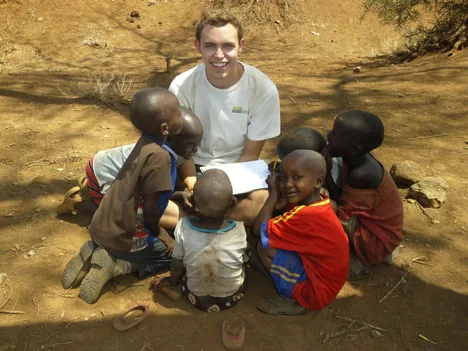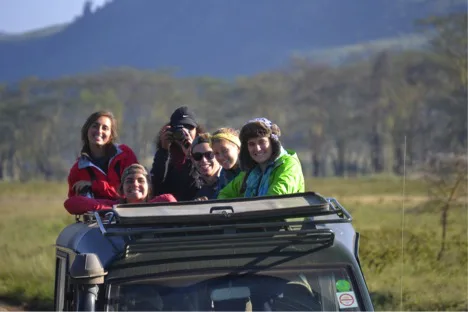Final Impressions of SFS Kenya & Tanzania
What did you like most about the SFS experience?
I didn’t come into this thinking that I’d fall in love with the students and staff; however, I’ve come away from this experience with 70 new family members. The familial atmosphere in both countries fostered amazing friendships and experiences that I will never forget, including the time we did the rain dance while standing next to a waterfall in Lake Nakuru National Park. I’ve also gained a renewed appreciation for the outdoors and enjoyed our countless traveling field lectures in which we were surrounded by acacia woodlands. Living and learning in the area of study provided a greater context to the environmental issues of East Africa and in turn I was more invested in the Directed Research project.

You’ve been in the country for a full semester – tell us your impression of it now.
Before I had even spent five minutes in Tanzania or Kenya, my main focus was on wildlife and all the animals that we would get the chance to see in the coming weeks. Although I will cherish the first time I saw a giraffe and a cheetah, the people of East Africa have had such a great impact on my experience here.

The staff members of both field stations are exceptional and I have come to love them as my own family. At the same time, the surrounding communities have been extremely welcoming on the days we venture into town and during the data collection process of our Directed Research project. These small, but memorable moments with Tanzanians and Kenyans have allowed me to see the beauty of these two countries. I will never forget when I helped make ugali with my homestay mama and we managed to enjoy each other’s company by laughing at my poor attempt at Swahili, or the time I spent an hour after DR data collection drawing with the Maasai children outside a boma near Amboseli National Park.
The landscape, wildlife, and especially the people are better than anything I’ve experienced before and I’ll always cherish my time in East Africa.
What is life at the field station really like? What are the best and the most challenging parts of living at a remote field station?
Living at the field station is essentially like living at a summer camp. You have countless sporting activities happening simultaneously with Mt. Kilimanjaro as the backdrop to the most scenic view in the world. Walking outside at night to go to the bathroom and brush your teeth takes some time for adjustment; however, I’ve come to love when we all gather for teeth brushing parties at the “watering hole.”
Personal space at the field stations is rare, but living in close encounters with 27 other college-aged students makes you come out of your shell and create unforgettable friendships. The best part of living at a remote field station is the inability to go out and buy essentials and necessities; you learn to make do with what you have and end up saving money. However, the variability in electricity and wireless internet while in the midst of Directed Research can be a nuisance.
What ended up being your biggest challenge this semester both academically and culturally?
In terms of academics, I struggled in my Swahili class and wish I had been more proactive at the beginning of the semester to learn the language. Languages often don’t come easily to me and Swahili wasn’t the exception. This really complicated my interaction with the staff in Tanzania because a majority of the staff speaks only Swahili. However, once I return to the US, I plan on picking up the language again and calling the other students to practice.
The biggest challenge I faced culturally had to be during the Directed Research portion of the semester. After I interviewed a woman for my project, she asked me the purpose of my work and if I could provide her any financial support. Since that moment, I’ve struggled to not look at the locals as an obstacle to wildlife conservation and the main cause of environmental degradation, but rather people just trying to make a living with what they have. This semester has broadened my perspective of different cultures and customs, especially for people living in developing countries. While we come from a country where environmental issues are often at the forefront of political debates and wild animals are admired in zoos, most individuals from other countries don’t have the luxury to concern themselves with these issues and must focus on how they’re going to survive from day to day.
What is the best memory you have from the semester? Give some highlights.
Probably the best moment from this semester was when we set up a reading program at the local school in Rhotia, Tanzania. I was overwhelmed with nerves the first time, but quickly came to love the children. When we separated into groups, all the boys swarmed me, pulled me to a desk, and crammed around me as I began reading one of their favorite books, Chicka Chicka Boom Boom. I’ve never enjoyed working with children so much in my life, especially children willing to read along while still finding time for those moments of laughter.
Another great moment from this semester was the exceptional Banda Wars—put on by the Spirit Committee—and Halloween. All of the students were split into two groups based on their banda and we competed against each other in volleyball, soccer, tug-of-war, and a relay race. We ended the exhausting, but amazing day by dressing up for Halloween as each other, mimicking mannerisms and wearing each other’s clothes.
Give three adjectives that best describe how you are feeling right now.
Enlightened. Peaceful. Nzuri sana (Very good)
Related Posts

Camila Rojas: Alumni Spotlight⭐

